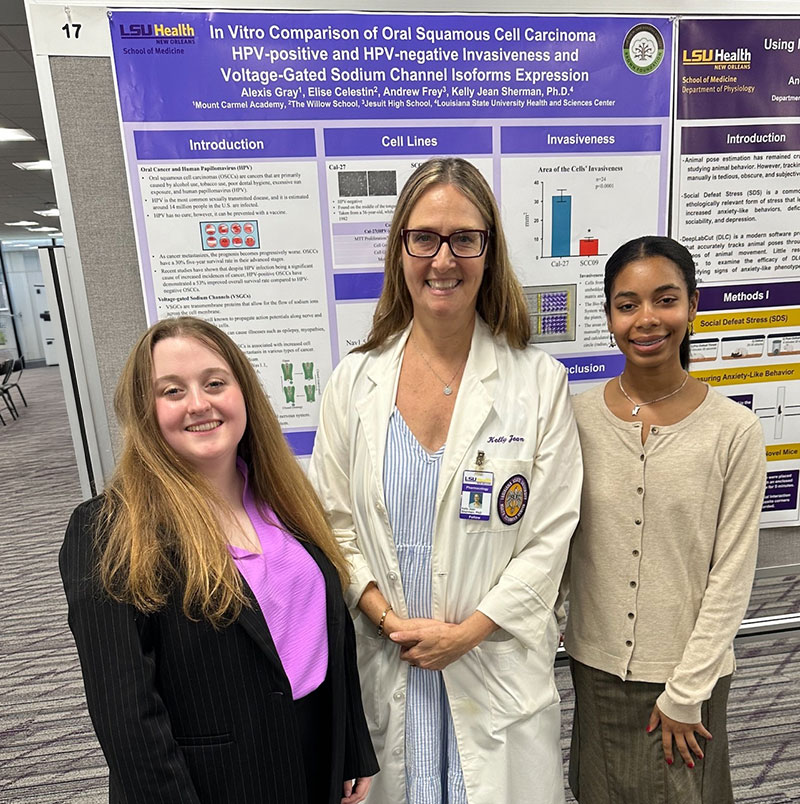Cultivating Future Scientists: High School Mentorship at LSU Health New Orleans and LSU LCMC Health Cancer Center
August 27, 2025
Every summer, a quiet transformation takes place in the labs of LSU LCMC Health Cancer Center. Amidst the sounds of centrifuges and the glow of microscopes, high school students gain hands-on experience with cancer research, guided by mentors who are as passionate about teaching as they are about science.
Dr. Kelly Jean Sherman, Assistant Professor of Research, Pharmacology, has been at the heart of this transformation since 2020. Through a mentorship program funded by the Joe W. and Dorothy Dorsett Brown Foundation, Dr. Sherman recruits and mentors high school students, offering them a rare opportunity to explore scientific research in a real lab setting.
“They can read about it or see it on TV and maybe fantasize about it, but actually being there and handling the pipettes, taking care of a cell line – it’s giving them that confidence to walk into a laboratory and know what to look for,” Dr. Sherman says. “They can critically think about what they need to do.”
This internship is one of many offered through the LSU Health system. Others include ones geared toward undergraduates, medical students, and high school teachers. But Dr. Sherman’s focus is on the youngest group, allowing her to ignite their curiosity early, build their confidence in a professional lab setting, and show them that a future in science is not only possible – it’s theirs to claim.
Building Confidence, Critical Thinking, and Curiosity
LSU LCMC Health Cancer Center’s summer internship is designed to gradually introduce high school students to the complexities of laboratory work. But just as importantly, it empowers them to think independently and problem-solve in a professional environment.
“It’s an adult environment, a real working environment,” explains Dr. Sherman. “It’s giving them confidence in how to handle themselves in these types of environments.”
Within a laboratory setting, critical thinking is key. “I want them to be able to ask questions and think about how to solve some of the problems they come up with in the lab,” Dr. Sherman explains. “If something isn't working, how would you go about changing that? If there is a mistake or a failure in an experiment, what do you think happened? How are you going to do it differently? Let's go forward with that.”
Of course, all of this occurs in an environment heavily saturated in science. Where high school classes might introduce concepts, this internship builds on those ideas and builds curiosity by immersing students in work that directly impacts real research.
A Pipeline to Future Careers
For Dr. Sherman, the internship program is about more than lab skills. It’s about planting seeds for the future.
“The most important thing is starting to expose the population at a younger age to the possibility of cancer research,” she explains.“ When they get to a certain age, sometimes their minds have already been made up about what they're going to do when they get to university. The younger you can expose them to this type of research and get them excited about it and think, ‘I can do that’ – it’s really about the pipeline.”
She compares real experience in a lab to visiting New Orleans for the first time. “I can tell you all these great things about it and you'll be like, ‘Oh yeah, I want to come visit.’ But until you experience it, you'll never actually fall in love with it,” she says.
With science, she says the same process can occur. “You might like science, but you might not fall in love with it. You have to experience that one moment where you’re like, ‘This is what I want.’”
Even if students don’t pursue a lab career, the experience gives them valuable insight into the research process – time, resources, and collaboration – that they can carry into any profession.
“Maybe they go into engineering or policy. Having them have that exposure to what research is about, what time and effort goes into research resources—that’s a really important thing,” she says.
The Lasting and Extensive Impact of Mentorship
Mentorship isn’t a one-way street. As students are exposed to science, mentors also grow in the process. For Dr. Sherman, working with interns has helped her understand her role in research from another perspective.
“It can get daunting or feel like, ‘Where's the reward?’” she explains. “With mentoring, you see that reward immediately because it's not only about the research for cancer but it's also how this person might really make a difference, not only in their lives, but in other people's lives.”
The program’s impact reaches far beyond those within the laboratory walls. “It's not only about the research, but it's really for the whole community at all levels. Not only just the ones to mentor, but people who might have had family members diagnosed with cancer or maybe not,” Dr. Sherman says. “We’re expanding that pipeline and trying to expand our outreach.”
By fostering early exposure and building a diverse pipeline of future advocates and professionals, the mentorship program helps ensure that cancer research continues to advance with passionate, informed supporters at every level – one mentee at a time.
Interested in a mentorship program at LSU LCMC Health Cancer Center? Find out more information here.
